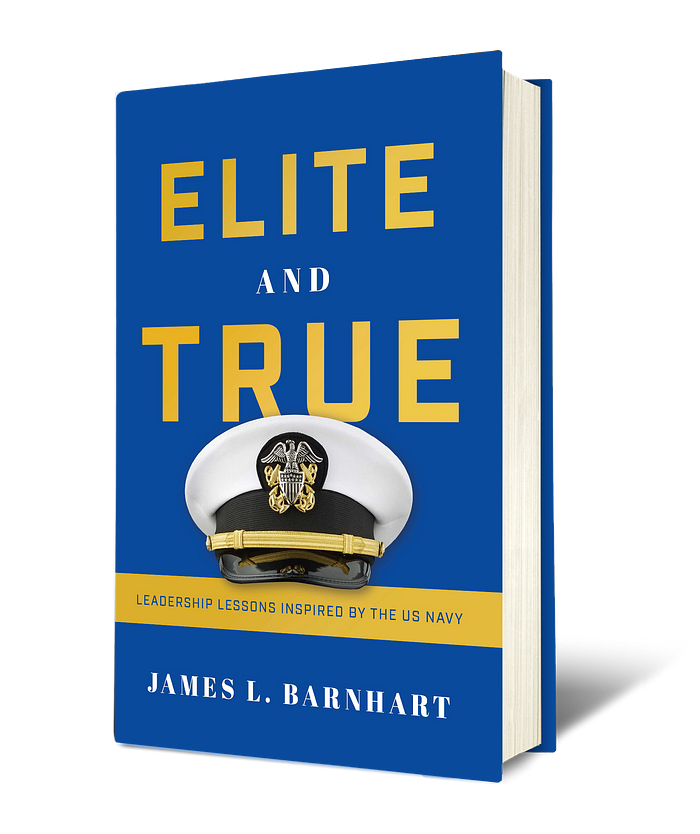Elite and True
The following is an excerpt from Elite and True, by James L. Barnhart, available on August 9, 2022 from Greenleaf Book Group.

INTRODUCTION
My working days started at an early age. While still in grammar school, I began working on a local farm, being paid by volume for picking strawberries and raspberries during the summer. Through middle school, I continued farm work during the summers and added daily newspaper delivery year-round. By high school, I had earned the experience and trust of the farmer to move from picking berries to working for hourly pay as field boss overseeing efficient and effective field harvesting, and to harvesting corn, potatoes, and hot-house rhubarb. This expanded the work from a seasonal summer job to weekend and school-break employment through the fall and into the winter.
The days were long. I came to appreciate the cool morning air during the six o’clock hour before the summer sun began its relentless march across the southern sky. The humidity in the well-irrigated fields was high, as midday temperatures frequently hovered in the 80s with an occasional burst up to triple digits Fahrenheit. When the farm workday ended and my field mates headed home, I headed to my newspaper route to deliver the afternoon edition before meeting up with cross-country teammates for a training run.
Physical fitness came with the work. The modest lifestyle farm depended upon manual labor for most operations. Harvesting berries required reaching from ground level with strawberries to overhead and anywhere in between with raspberries. The full “flats” of berries — wooden crates with a dozen waxed-paper boxes used for harvesting berries bound for cannery processing — added weight quickly, and stacking them onto the flatbed truck where they would tower up to a height of five feet required repeated climbing up and down. Corn harvesting involved removing ears from stalks, counting a gross of ears into waxed cardboard boxes, and stacking the packed boxes onto the flatbed truck for transport to market. Potato harvesting required picking up from the soil the spuds unearthed by a mechanical digger and placing them into burlap sacks. The full sacks weighed up to 100 lbs. and had to be manually lifted onto the three-foot-high field truck bed.
Eight hours of farm work followed by a bicycle ride to the newspaper pick-up point, stuffing the papers into a heavy canvas double-pouch carrier bag, wrestling the loaded bag over my head for balanced front-back shoulder carry, then trudging door-to-door for the two-mile circuit of the newspaper delivery route built muscle and discipline.
On top of that, customer feedback built character. With area rainfall exceeding 45 inches in an average year, each home-delivery customer had a preferred delivery spot for the newspaper where it would stay dry and where they could most readily retrieve it without getting doused themselves. To accumulate nearly four feet of water annually, the weather was inclement nine months of the year, ranging from an annoying drizzle to what my father called a “frog-strangling downpour” interspersed with an occasional snowfall during the winter. On one particularly obnoxious day, large raindrops pounded off the pavement and bounced back up to knee height. As I opened the stormproof screen door to sandwich the rolled newspaper between that and the front door — the specified delivery requirement for this house — an elderly lady swung open the front door to my surprise. With piercing eyes and a harsh tone, she snatched the paper from my hand and demanded, “Have you ever tried to read a wet newspaper?” She berated me for more than a minute, complaining about the paper being too wet in recent days and how she could even see my wet fingerprints on today’s front page. As I stood in the torrential downpour taking in her feedback, water streaming down my face, droplets sequentially rolling from my fingertips to join those bouncing back up from her porch, I apologized. I committed to pulling her paper from the middle of the stack in the days ahead, which would lessen the moisture absorbed from the saturated canvas bag slung over my shoulders. As character-building as daily newspapers delivery could be, the monthly collection cycle could prove just as entertaining. My knock on the door was often followed by shushing sounds inside the home and occupants telling one another to keep quiet until the paperboy-come-to-collect moved on to the next home.
Time for introspection abounded as I went about my day’s work. The many hours trudging in the rain, snow, or even in the blazing sun to deliver newspapers gave me ample time to ponder my career path. The hours toiling in the farmer’s field, hoeing weeds when not harvesting crops, added to my thinking time. I was tallying the pros and cons of studying to be a veterinarian late one hot summer afternoon while hoeing weeds from rows of immature strawberry plants when a commotion arose. The farm had recently suffered a break to an irrigation line buried underground at the intersection of two dirt access roads, and the force of escaping water had eroded a pit six feet across and four feet deep. A truck driver, who had just refreshed the portable toilets about the farm as his last stop at the end of a long day, had cut the corner too close and sunk his right rear axle into the pit. The twisted tipping of his full truck caused part of his tank load to spill into the pit. The farmer summoned me with a shovel to help dig out the true shithead driver.
Timing is everything.
Not long after I helped excavate the “sanitary” truck driver, my business-executive uncle phoned to inquire my interest in moving from outdoor farm work in dreary Washington State to an indoor stint in sunny California. Trading field labor with a hoe for indoor work with a computer was an easy decision for a high school kid. It would be hard to leave my friends and teammates in Washington, but it would only be for the summer and I could continue my training for the upcoming cross-country season in the San Francisco Bay Area. Uncle had arranged everything for a successful summer internship, from securing a job with the warehouse team at Commodore Business Machines to clearing a bedroom in his house and allowing me to ride to and from work with him. I happily accepted his kind offer and flew to San Jose for the balance of the summer break.
Warehouse work was enlightening. An experienced coworker walked me through the receiving process, explaining how to populate the pertinent data fields in the inventory control database, and where to route the materials that needed quality inspection separate from those that went directly to stock. Toward the end of the quarter, the shipments increased and I moved to the shipping area to package computers and load outbound trucks. As labor demand across departments ebbed and flowed, I learned the work across multiple areas and floated to wherever I was most needed. The work was educational and fun, as I met new people and learned both new products and new processes. As my competence increased, my supervisor enjoyed my contributions. Tasks that had been the purview of his role, he began assigning to me. It was a win-win situation; he gained free time while I learned new things. As he learned he could rely on me for coverage, however, he began to take more frequent breaks and to leave earlier for lunch and to return a bit later in the afternoon. He may have been an adequate supervisor, assigning tasks and seeing that work was completed by subordinates, but he was not much of a leader. He provided no inspiration and slacked off when the opportunity presented itself.
Conversations with my uncle that summer were more inspiring. On our morning and evening commutes together we discussed an incredible range of topics, from the mundane activities of the day to the thought-provoking questions about life. What career path would I pursue? How did he come to be vice president for marketing and sales at Commodore? Through our discussions, I became convinced that microelectronics would be the future and that I would study electrical engineering after high school.
Our conversations grew more profound through time. Uncle was CEO of Eagle Computer when he offered me a similar internship arrangement as an engineering technician the summer after my sophomore year of college. One sunny afternoon as we drove home from the office, he shared his vision for where he would take the company. Impressed, I could not help but ask, “Where do you get the confidence?” He burst into hearty laughter before explaining a fact that I had never pondered before and that I struggled to believe at the time: Most people want to be led! Bring forward a vision for a better future and people will gladly follow.
I did not truly appreciate this pearl of wisdom at the time but I had the good fortune to have outstanding leadership role models within my immediate family. My father, James Ace Barnhart, and my aforementioned uncle, Dennis Ray Barnhart, pursued distinctly different career paths in public service and in corporate business, respectively. They both rose to lead their chosen organizations to excellence. Other than the two being brothers, the common denominator to their leadership success and their career launching point was their training in the United States Navy.
The USN instilled in them the principles of discipline, teamwork, physical fitness, and leadership that launched their civilian careers after separation from military service. James, a radioman, became a civilian firefighter who demonstrated determination and discipline while earning promotions to captain, assistant chief, municipal fire marshal, and chief. He adhered to existing codified rules in the early days, then drafted new ones to enable firefighting and emergency response to grow to accommodate population and jurisdiction expansions. Dennis, an aviator, took an entrepreneurial path, developing products ranging from saltwater aquariums to calculators, handheld electronic games and personal computers. Both these role models observed elements in their surroundings that could or should be improved upon, then set about effecting the desired changes.
When deciding my own education and career path, I chose a blend influenced by both their leads, completing studies in electrical engineering before joining the USN’s elite Nuclear Propulsion Officer Candidate program and pursuing service aboard a nuclear submarine. Elite and True is the story of my experiences during seven years of naval service and my transition to corporate America’s executive career track with a personal distillation of lessons collected along the way. It chronicles my growth through four stages, from an unsure follower in Part I to a determined follower in Part II, to a positional leader in Part III, and finally a true leader in Part IV. Each piece of leadership advice derives from a real-world situation I faced, which I share in experiential form before contextualizing it more generally in a leadership lesson at the end of each chapter for broader application to leadership situations elsewhere. Although the book’s four parts follow the timeline of my personal journey, I encourage you to pull from the leadership lessons offered here in the order you deem most appropriate to your own leadership situation.
I believe the true leaders among us inspire others to perform at renewed levels. The true leader exudes passion, confidence, and intelligence that motivates others to follow, without relying upon a hierarchical title of a given position as the basis for authority to lead. To the subordinates bound by organizational hierarchy to do as directed by the positional leader, a true leader offers a refreshing change. People are drawn to a true leader, with or without a title that denotes a formal position.
Enjoy your journey toward increased productivity with strengthened workforce morale as you apply these elite (and true) leadership lessons.
